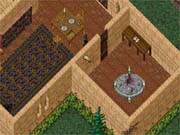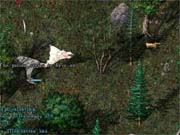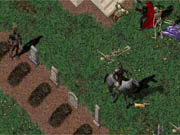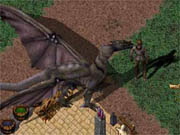In less than six months, Ultima Online will celebrate the fifth anniversary of its initial retail release. Ultima Online is still the only massively multiplayer game that meaningfully attempts to create a virtual world in which you can develop characters that can be adept at activities other than devastating resident fauna. While that novel aspect of the game may still appeal to new or established players, Ultima Online is otherwise so dated that it is unlikely to be able to sustain its unprecedented commercial longevity. Lord Blackthorn's Revenge is the most recent, and least ambitious, of the four major iterations of the game, and it's unlikely to induce new players to an increasingly dated game.

Ultima Online has changed a lot since it was initially released in September 1997, but Lord Blackthorn's Revenge doesn't significantly alter the game's status quo. Lord Blackthorn's Revenge adds a relatively small new area to explore, which is located in the center of the large continent introduced by the game's last major expansion, Third Dawn, and adds a handful of new items to craft and monsters to fight. The new monsters are largely cyborg creatures designed by popular comic book artist and action figure designer Todd McFarlane. Although the first couple of games in the core Ultima series had science fiction elements, the introduction of these science fiction monstrosities seems incongruent with the medieval swords and sorcery setting established by the past 20 years of Ultima games. Their inclusion doesn't seem to be indicative of a significant change to Ultima Online's design, however, and was more likely just motivated by a desire to at least get some utility out of designs previously created for Ultima Online's aborted spin-off, Ultima Worlds Online: Origin. The Lord Blackthorn's Revenge iteration of Ultima Online plays almost exactly the same as the Third Dawn version of the game.
Even the developers seem to be treating Lord Blackthorn's Revenge as a less significant event than the earlier expansions. The first two expansion packs provided purchasers with a large bound paper version of the game's playguide manual, but that practice was abandoned for the Third Dawn release. Lord Blackthorn's Revenge also ships with only an abbreviated version of the game's playguide, but the developers haven't yet bothered to update the online version of the game's manual to account for the changes introduced by the new iteration. The new creature types have been gradually introduced, while the game's overall plot is developed through in-game events, but such events do a poor job of conveying any comprehensible storyline. A comic book and an unpainted action figure are included with the retail release of the game to help introduce the plot developments apparently contemplated by the expansion, but the new fictional elements are unlikely to have any significant impact on the experience offered by Ultima Online. As always, the generation of novel events remains primarily dependent on the efforts of Ultima Online's players, just as in many of the multiuser dungeons (MUDs) on which Ultima Online was originally modeled.

While it doesn't introduce significant changes, Lord Blackthorn's Revenge is likely still a worthwhile upgrade for existing Ultima Online players, particularly if they are still using the game's 2D client software. The 3D client introduced by the Third Dawn expansion has proven to be less popular than Electronic Arts anticipated, and Lord Blackthorn's Revenge recognizes the continuing appeal of the 2D client by finally letting players access the lands introduced by Third Dawn using the 2D client. Rather than continue to hope that players will eventually migrate to the 3D client, the developers have enhanced support for the 2D client by improving some of the game's 2D graphics. Lord Blackthorn's Revenge also finally retires the game's dated MIDI music by replacing it with MP3 digital tunes. The new player tutorial has also been improved, and there are also a few general interface tweaks, but Lord Blackthorn's Revenge will primarily appeal to existing players. Just having access to new areas to explore, creatures to fight or harness, and items to craft or otherwise acquire is probably reason enough to justify an upgrade for fans still enamored with the existing game.
The release of the latest iteration of Ultima Online is an appropriate occasion to summarize the game's current state, particularly to allow gamers who are either new to Ultima Online or who abandoned it months or years ago to judge whether it would now be a worthwhile purchase. If you played Ultima Online since the Third Dawn expansion was released and didn't enjoy the experience, the latest iteration won't prompt you to change that opinion unless the sole reason for your dissatisfaction was the inability to use the 2D client to explore the entire gaming world. If you only played the game prior to the Renaissance expansion or have been avoiding the game because you heard horror stories of characters being consistently killed or looted by other players, you can now completely avoid that sort of harassment. If you actually liked the prospect of fighting other players, you can either engage in sanctioned guild battles or just hop in a moongate to travel to an alternate version of the game's main landmass where you're still free to hunt other players, subject to some punitive sanctions for players designated as murderers. On a dial-up connection, gameplay is still more susceptible to lag-induced slowdowns than more recently released online RPGs, but optimizations introduced by the developers combined with the fact that areas are much less likely to be overpopulated than they once were now usually make lag inconsequential. Accordingly, the two biggest problems with the initial release of Ultima Online (the game's poor handling of Internet lag and being forced to deal with player-killing and other antisocial behavior) have been rectified by the game's subsequent development.
A number of other causes of frustration have been addressed since the game was initially released. The inclusion of a comprehensive tutorial, additional character-development templates, and a personal, daily "power hour" now make it considerably easier for neophyte or casual players to quickly develop characters who are capable of exploring the gaming world. No longer are you required to first waste several hours pounding practice dummies and chopping wood or fishing to acquire the basic skills and money to make a character viable for venturing out of the game's civilized areas. You can now equip a new character with a decent set of equipment and have the mandatory skills for the type of character you want to play within a couple of hours of booting up the game. Fleeing in terror from puny bunny rabbits is now only optional, thanks to the gameplay changes introduced by the past several game iterations.

The character-development system remains unique among online RPGs. Games such as EverQuest and Dark Age of Camelot are hack-and-slash treadmills that primarily motivate characters to gain experience levels so that they can gain level-based abilities and be more effective in combat. You are encouraged to kill monsters to get better equipment and more experience points to, in turn, gain character levels so that you're better able to kill more monsters and get even better loot. Ultima Online offers more varied gameplay to players who want to interact with the gaming world other than by chopping up monsters, and its skill-based character-development system is more consistently rewarding, since characters constantly gain incremental improvements to their skills based on their current activities. While other online RPGs let you craft weapons or other equipment, Ultima Online lets you delve into non-combat-oriented activities in much more detail. While many gamers will find it tedious to spend hundreds of hours clicking on pixilated trees or virtual water to develop a lumberjacking or fishing grand master, other gamers will be enthralled by the opportunity to create their own shops and hire nonplayer character vendors to sell the fruits of their arduous labor. Ultima Online offers at least as robust a variety of non-combat-oriented activities as The Sims and has a similar kind of appeal, since many players seem dedicated to ensuring that their virtual abode is appropriately decorated with exactly the correct ensemble of handcrafted furniture and luxury items.
While Ultima Online may offer the best virtual sandbox of any of the currently available online RPGs, it is extremely dependent on the communities of players that have developed for any larger sense of purpose. Aside from a handful of tasks in the introductory tutorial and the basic escort duties you can get from nonplayer characters, there are no quests whatsoever in the game. Previous expansions have actually made nonplayer characters less interesting than they were in the game's initial release. You used to be able to carry on detailed conversations with NPCs, and one of the most frequently iterated war stories of the developers involved franchise founder Richard "Lord British" Garriott being deceived into believing that he was speaking with another human player when he encountered his first NPC. You'd have to be a complete blockhead to make the same mistake now, since the desire to appeal to players located around the world who spoke a variety of languages prompted Electronic Arts to radically simplify the conversation system to a handful of basic words. The latest expansion ensures that those words (buy/sell/train/escort/destination) are always available for display in a convenient menu, but NPC conversations are now more simplistic than they've been in any Ultima game since 1983's Ultima III. Because an employee-wages lawsuit was brought by player volunteers, player-generated events are also less frequent than they once were. Both those developments make the gaming world less interesting than it once was.
The game's interface and combat systems are both poor, especially relative to those in other online RPGs. The maximum resolution available in the game is 1024x768 in full-screen mode or 800x600 in the windowed mode offered by the 3D client. While those resolutions are comparable to those offered by other isometric-perspective RPGs, the game's graphics still look comparatively dated and simplistic. The interface is awkward, and even using the game's windowed mode, it's difficult to retain access to all of the information you'd expect to have readily available and yet maintain a relatively unobscured view of a decent amount of the gaming world geography. While you can press the Ctrl/Shift keys to bring up more-accessible text descriptions of items and creatures currently onscreen, it's often difficult to target monsters that are lurking around trees or other obstacles or fighting with other characters. For a multiplayer game, Ultima Online is surprisingly inconvenient to play with a group of other adventurers, since there's no way to automatically share loot or coordinate movements or attacks. While you can have your character automatically follow another character, it's very easy for your character to get dislodged on terrain when traveling even short distances. Even once you've gotten organized, group combat against monsters tends to devolve into chaotic melees near creature respawn locations, with creatures reappearing so rapidly that it's difficult to maintain an organized hunt. Fortunately there are a number of things to do in Ultima Online other than hunt monsters, because the game's combat is both simplistic and difficult to control.

Probably the most promising new development is the introduction of a system that encourages you to role-play your characters in accordance with the virtues that played a key role in the core Ultima series. The virtue system hasn't been entirely implemented yet, but it is eventually intended to provide you with the opportunity to essentially have your characters embark upon Ultima's famous "Quest of the Avatar" to achieve a path of enlightenment. It's a laudable attempt to give Ultima Online a larger sense of purpose, but to date it hasn't been executed in a manner that provides a very compelling experience.
Whether or not you'll enjoy Ultima Online depends on whether you find appealing the prospect of establishing your own objectives within a virtual sandbox and then constantly repeating a number of relatively mundane tasks to achieve those goals. That's not tedious to players who are excited by the prospect of living a virtual profession in a gaming world that's not entirely focused on battling monsters. However, the graphics, interface, and combat system are so cumbersome and dated that Ultima Online's appeal is becoming increasingly niche. Its uniqueness has allowed Ultima Online to boast an unprecedented record for commercial longevity, but the game is finally running out of steam.